#1933 world economic conference
Explore tagged Tumblr posts
Text
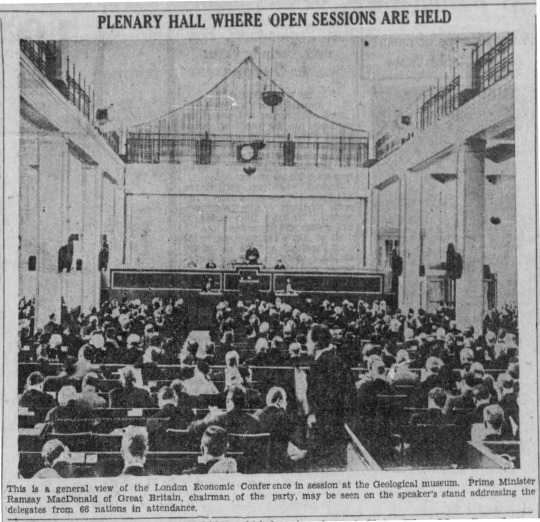
"PLENARY HALL WHERE OPEN SESSIONS ARE HELD," Kingston Whig-Standard. June 27, 1933. Page 9. ---- This is a general view of the London Economic Conference in session at the Geological museum. Prime Minister Ramsay MacDonald of Great Britain, chairman of the party, may be seen on the speaker's stand addressing the delegates from 66 nations in attendance.
#london#1933 world economic conference#capitalism in crisis#world conference#world crisis#ramsay macdonald#prime minister of the united kingdom#british empire#british history#interwar period#great depression in the united kingdom
1 note
·
View note
Text
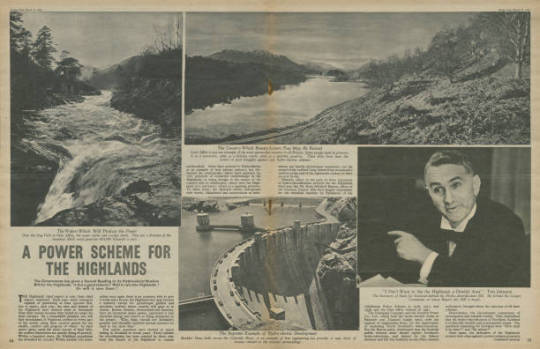
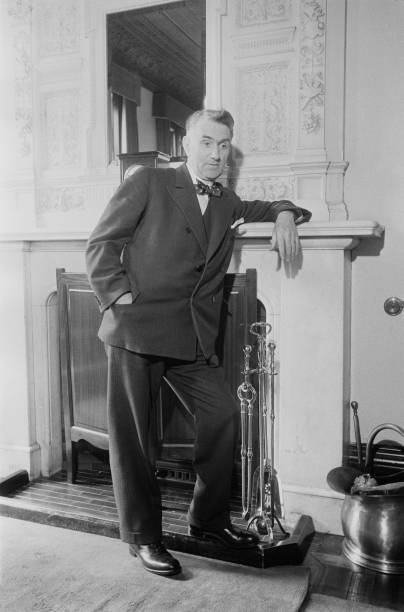
Tom Johnston, one of Scotland’s best known Secretaries of State, was born on November 2nd 1881.
Now and again I bend the rules and cover a politician in my posts, Tom Johnston is such a case, a remarkable man who lived to see the Highlands transformed, bringing electricity to regions who had, until then had very little or none in the years up to Woerld War Two,
Johnston was the son of David Johnston, a grocer, and his wife, Mary Blackwood, he was born in Kirkintilloch in and educated at Lairdsland Public School then at Lenzie Academy.
Tom then entered the University Glasgow where he became interested in politics and stood successfully for a local election in 1903 representing the Independent Labour Party.
In 1906, thanks to inheriting a printing press from a relative, he was able to set up The Forward, a radical weekly paper that reflected his Fabianism and teetotalism. He remained editor until 1933. It was in the early days of running the paper that he matriculated at the University as a mature student aged twenty-three.
In 1907 he continued his education and took a class in Moral Philosophy and gave his address as the Student Settlement, a pioneering student association interested in social improvement. The following year he enrolled for Economics, but he left without graduating.
He married Margaret F. Cochrane in 1914 and they were married for over 50 years, they had two children.
During the The First World War he advocated peace and attacked war profiteers. After the war he stood for parliament, and in 1922 won West Stirlingshire for Labour. The period of his greatest achievement was during the Second World War. Churchill appointed him as secretary of state for Scotland in 1941. He worked with colleagues of all parties to galvanise the Scottish economy on a war footing.
It was Tom Johnston who was instrumental in creating the North of Scotland Hydro- Electric Board, his greatest achievement, handling rural Scotland's resistance and hesitation towards the project intelligently. Until the 1940s, many rural areas of Scotland outwith the Central Belt had little or no electricity supply. There were coal-fired steam-turbine and some diesel-driven power stations serving urban locations.
In the three decades following the Second World War, the Hydro Board's teams of planners, engineers, architects and labourers succeeded in creating an epic succession of electricity generation and distribution schemes that were world-renowned not only for successfully achieving their technical aims in very demanding terrain but for often doing so in an aesthetically inspiring manner. The economic and social benefits thus brought to all the people of Scotland, and especially those in rural areas, were immense and long-lasting
In 1920 he published the History of the Working Classes in Scotland and from 1950 to 1952 he served as President of the Scottish History Society.
The University of Glasgow conferred the degree of Honorary LLD in 1945. In 1948 he was awarded the Freedom of the City of Aberdeen. He was also Chancellor of Aberdeen University from 1951 until his death.
Thomas Johnston died on 5th September 1965 in Milgavie.
18 notes
·
View notes
Text

Moscow Artists' Brigade, "Communism is Soviet Power Plus the Electrification of the Whole Country," 1933
The GOELRO electrification plan was one of the first major infrastructure projects of the new USSR. Addressing the Moscow Gubernia Conference of the Russian Communist Party, Lenin stated that the struggle for socialism should turn towards internal development, since the Red Army had thoroughly been defeated in the Miracle on the Vistula a few months earlier.
"...we have not achieved the main object: to show that the proletariat will restore large-scale industry and the national economy so that the peasants can be transferred to a higher economic system. After proving that, by revolutionary organization, we can repel any violence directed against the exploited, we must prove the same thing in another field by setting an example that will convince the vast mass of the peasants and petty bourgeois elements, and other countries as well, not in word but in deed, that a communist system and way of life, can be created by a proletariat which has won a war. This is a task of world-wide significance. To achieve the second half of the victory in the international sense, we must accomplish the second half of the task, that which bears upon economic construction."
#futurism#soviet art#art history#avant garde#history#disco elysium#soviet union#soviet futurism#socialism#fully automated luxury gay space communism#communist
11 notes
·
View notes
Text

“Depending on how we define the money supply—and I would define it very broadly as all claims to dollars at fixed par value—a rise in the gold price sufficient to bring the gold stock to 100 percent of total dollars would require a ten- to twentyfold increase. This of course would bring an enormous windfall gain to the gold miners, but this does not concern us. I do not believe that we should refuse an offer of a mass entry into Heaven simply because the manufacturers of harps and angels' wings would enjoy a windfall gain. But certainly a matter for genuine concern would be the enormous impetus such a change would give for several years to the mining of gold, as well as the disruption it would cause in the pattern of international trade.
Which course we take, or which particular blend of the two, is a matter for detailed study by economists. Obviously little or none of this needed study has been undertaken. I therefore do not propose here a detailed blueprint. I would like to see all of those who have become convinced of the need for a 100 percent gold standard join in such a study of the best path to take toward such a goal under present con-ditions. Broadly, the desired program may be summarized as follows:
1. Arrival of a 100 percent gold dollar, either by deflation of dollars to a gold stock valued at $35 per ounce, or by revaluation of the dollar at a "gold price" high enough to make the gold stock 100 percent of the present supply of dollars, or a blend of the two routes.
2. Getting the gold stock out of the hands of the government and into the hands of the banks and the people, with the concomitant liquidation of the Federal Reserve System, and a legal 100 percent requirement for all demand claims.
3. The transfer of all note-issue functions from the Treasury and the Federal Reserve to the private banks. All banks, in short, would be allowed to issue deposits or notes at the discretion of their clients.
4. Freeing silver bullion and its representative in silver certificates (which would now be issued by the banks) from any fixed value in gold. In short, silver ounces and their warehouse receipts would fluctuate, as do all other com-modities, on the market in terms of gold or dollars, thus giving us "parallel" gold and silver moneys, with gold dollars presumably remaining the chief money as the unit of account.
5. The eventual elimination of the term "dollar," using only terms of weight such as "gold gram" or "gold ounce." The ultimate goal would be the return to gold by every nation, at 100 percent of its particular currency, and the subsequent blending of all these national currencies into one unified world gold-gram unit. This was one of the considered goals at the abortive international monetary conferences of the late nineteenth century. In such a world, there would be no exchange rates except between gold and silver, for the national currency names would be abandoned for simple weights of gold, and all the world's money would at long last be freed from government intervention.
6. Free (but presumably not gratuitous) private coinage of gold and silver.
I must here differ with Professor Mises's and Henry Hazlitt's suggestion for return to the gold standard by first establishing a "free market" in gold by cutting the dollar completely loose from gold, and then seeing, after several years, what gold price the market would establish.45 In the first place, this would cut the last tenuous link that the dollar still has to gold and yield us a totally fiat money. Second, the market would hardly be a "free" one, since almost all the nation's gold would be sequestered in government hands. I think it important to move in the reverse direction. The Federal government, after all, seized the people's gold in 1933 under the guise of a temporary emergency. It is important, for moral and economic reasons, to permit the people to reclaim their gold as rapidly as possible. And since the gold is still held as hostage for our dollars, I believe that the official link and official convertibility between dollars and gold should be reestablished as soon as Congress can be so persuaded. And finally, since the dollar is merely a weight of gold, properly speaking, it is not at all appropriate to establish a "market" between dollars and gold, any more than there should be a "market" between one-dollar bills and five-dollar bills.
There is no gainsaying the fact that this suggested program will strike most people as impossibly "radical" and "unrealistic"; any suggestion for changing the status quo, no matter how slight, can always be considered by someone as too radical, so that the only thoroughgoing escape from the charge of impracticality is never to advocate any change whatever in existing conditions. But to take this approach is to abandon human reason, and to drift in animal- or plantlike manner with the tide of events. As Professor Philbrook pointed out in a brilliant article some years ago, we must frame our policy convictions on what we believe the best course to be and then try to convince others of this goal, and not include within our policy conclusions estimates of what other people may find acceptable. For someone must propagate the truth in society, as opposed to what is politically expedient. If scholars and intellectuals fail to do so, if they fail to expound their convictions of what they believe the correct course to be, they are abandoning truth, and therefore abandoning their very raison d'être. All hope of social progress would then be gone, for no new ideas would ever be advanced nor effort expended to convince others of their validity.” - Murray Rothbard, ‘The Case for a 100 Percent Gold Dollar’ (1974)

#rothbard#murray rothbard#gold#gold standard#gwyneth paltrow#money#banks#banking#mises#ludwig von mises#hazlitt#william hazlitt#economics#finance#capitalism#anarchocapitalism#sex sells
4 notes
·
View notes
Text
"Lt. Gen. Michael Flynn has placed CBDC’s at the center of his “Great Awakening vs. Great Reset” rallies, held throughout the country. Flynn and other speakers suggest that Biden’s digital asset order is integral to the “Great Reset” strategy proposed by the World Economic Forum leader Klaus Schwab. (It at least notable that Flynn’s rallies carry the same title and themes as a 2022 book by Russian geopolitical strategist Aleksandr Dugin.)
An Instagram post featuring Flynn with conspiracy theorist Alex Jones said, “Global elites are trying to create a panic as an excuse to transition to CBDC total control,” suggesting that the March collapse of Silicon Valley Bank could be used as a pretense to introduce oppressive currency schemes.
Other versions of the conspiracy theory suggest that paper money will be banned, again citing Roosevelt’s 1933 Executive Order that outlawed gold. No such proposal is currently in place, and according to Liang’s recent statements, the Treasury would not pursue any such strategy without approval of Congress.
Politifact previously debunked similar claims about the FedNow service, writing “[FedNow] is not a central bank digital currency, and it is not replacing paper currency. We rated False a similar claim in September 2022, reporting that FedNow will not require banks to turn over all physical currency.”
These various conspiracy theories attempt to add, without evidence, central bank digital currencies to the pantheon of existing populist bogeymen (which includes the Federal Reserve, shadowy globalist central bankers, and the Chinese Communist Party) in what amounts to a recapitulation of the paranoid fears stoked by the forged 1903 anti-Semitic disinformation pamphlet “Protocols of the Elders of Zion.”
Conservative organizations the Federalist Society and Cato Institute are pre-emptively opposing CBDCs.(Sources: Federalist Society; Cato Institute)
Conservative organizations the Federalist Society and Cato Institute are pre-emptively opposing CBDCs.
(Sources: Federalist Society; Cato Institute)
The Federalist Society and the Cato Institute have both come out against CBDCs, portraying them as a near-term threat and an instrument of imminent authoritarian control, despite the fact that, according to Liang, no implementation plan exists in the United States at this time.
Populist political technologists like Bannon and Flynn have engineered a full-spectrum attack that deploys fears over CBDCs across both the left and the right. Robert F. Kennedy, Jr. may carry some appeal to people on the left who venerate his family’s legacy, while Ron DeSantis can attempt to energize the right with the same anti-CBDC messaging.
Donald Trump, recently indicted on 34 felony counts for falsifying business records, said during a post-indictment press conference that the “US dollar is crashing and will no longer be the world standard, and will be our greatest defeat in over 200 years,” another talking point popular with critics of CBDCs. Some online conspiracists also assert that Trump’s indictment was meant to serve as a distraction from the steady advance of a secret Biden CBDC agenda.
Fantastical theories about CBDCs and how they may be developed have diverged from reality, which, if officials decide to pursue the concept at all, will involve slow development and deployment after careful deliberation by both Congress and the Treasury.
But in the modern American political arena, outcomes are often influenced if not actually determined by those best able to play on the fears of the public, justified or not."
So the government is currently, carefully considering offering not only a regulated, trusted digital currency but also a regulated money service. This explains why Granny Doom Finger has decided to go Anti-Crypto. It's not to attack Silicon Valley's, which was tied to criminal activity across the spectrum, but a government, regulated, controlled currency they can't fuck with. Follow Dave Troy, the writer of this article, on Twitter. He's very smart.
."
3 notes
·
View notes
Link
0 notes
Text

Pastor Edward Victor Hill Sr. (November 10, 1933 – February 24, 2003). He was senior pastor at the Mount Zion Missionary Baptist Church in Los Angeles (1961-2003). It became one of the largest African American congregations in the US. He served as co-chair of the Baptist World Alliance and was aligned with fellow evangelists such as Billy Graham.
He was born in Columbus, Texas, the son of William and Rosa Hill. He obtained a four-year scholarship to Prairie View A&M University to study Agronomy.
He was called to pastor the Friendly Will Missionary Baptist Church in Austin and the Mount Corinth Baptist Church in Houston. He became a confidant of Martin Luther King Jr., whom he assisted in establishing the Southern Christian Leadership Conference. He became active in social issues, lobbying for government programs to provide housing and other basic amenities to poor, often rural Blacks.
He gave the inaugural prayer at Richard Nixon’s second inauguration and led clergy committees during the presidency of Ronald Reagan. He did support Jesse Jackson’s bid for the Democratic presidential nomination.
He was active in Los Angeles politics, backing the mayoral campaign of Sam Yorty over Tom Bradley and chairing the city’s Economic Opportunity Committee and Fire Commission during Yorty’s administration. He served as a special volunteer advisor in South-Central Los Angeles under Mayor Richard Riordan.
He was among the first African American preachers to broadcast on the Trinity Broadcasting Network. He served as leader of the California State Baptist Convention, associate professor of evangelism for the Billy Graham Evangelistic Association, and was a leading figure in the National Baptist Convention. He publicly defended the National Baptist Convention’s embattled president Henry Lyons.
He was opposed to the use of the term “Black”, stating that it was “theologically, philosophically and ophthalmologically unacceptable”, he preferred the term “Negro”.
His son, E.V. Hill II, succeeded him as senior pastor of Mount Zion. #africanhistory365 #africanexcellence
0 notes
Text
A look into Japanese history Part 8
Era of Emperor Taisho (1912-26):
Political power shifted from the oligarchic clique (genro) to the parliament and democratic parties.
World War I and Aftermath:
Japan joined the Allied powers but played a minor role.
At the 1919 Paris Peace Conference, Japan's proposal for a "racial equality clause" was rejected.
The 1924 US Exclusion Act prohibited further immigration from Japan.
Post-WW1 economic decline worsened by the 1923 Great Kanto Earthquake and the 1929 global depression.
1930s Militarization:
Military took control of the government, with political enemies assassinated and communists persecuted.
Indoctrination and censorship intensified.
Japan forced China into unequal treaties and increased its influence over Manchuria.
In 1931, the Kwantung Army occupied Manchuria and established the puppet state "Manchukuo."
In 1933, Japan withdrew from the League of Nations.
Second Sino-Japanese War (1937-45):
War broke out in July 1937, with Japan occupying much of China's coast and committing atrocities, notably in Nanking.
The Chinese government did not fully surrender, leading to prolonged conflict.
World War II:
1940: Japan occupied French Indochina and joined the Axis powers.
US and Britain reacted with an oil boycott, leading Japan to plan to capture the Dutch East Indies and go to war.
December 1941: Japan attacked Pearl Harbor and expanded rapidly in the Pacific.
June 1942: The Battle of Midway marked the turning point; Allies began reclaiming territories.
1944: Intensive air raids over Japan; US invaded Okinawa in spring 1945.
Surrender:
July 27, 1945: Potsdam Declaration demanded Japan's unconditional surrender.
August 6 and 9: Atomic bombs dropped on Hiroshima and Nagasaki.
August 8: Soviet Union entered the war against Japan.
August 14: Emperor Showa decided to surrender unconditionally.
1 note
·
View note
Text
Events 4.24 (after 1930)
1932 – Benny Rothman leads the mass trespass of Kinder Scout, leading to substantial legal reforms in the United Kingdom. 1933 – Nazi Germany begins its persecution of Jehovah's Witnesses by shutting down the Watch Tower Society office in Magdeburg. 1944 – World War II: The SBS launches a raid against the garrison of Santorini in Greece. 1953 – Winston Churchill is knighted by Queen Elizabeth II. 1955 – The Bandung Conference ends: Twenty-nine non-aligned nations of Asia and Africa finish a meeting that condemns colonialism, racism, and the Cold War. 1957 – Suez Crisis: The Suez Canal is reopened following the introduction of UNEF peacekeepers to the region. 1963 – Marriage of Princess Alexandra of Kent to Angus Ogilvy at Westminster Abbey in London. 1965 – Civil war breaks out in the Dominican Republic when Colonel Francisco Caamaño overthrows the triumvirate that had been in power since the coup d'état against Juan Bosch. 1967 – Cosmonaut Vladimir Komarov dies in Soyuz 1 when its parachute fails to open. He is the first human to die during a space mission. 1967 – Vietnam War: American General William Westmoreland says in a news conference that the enemy had "gained support in the United States that gives him hope that he can win politically that which he cannot win militarily". 1970 – China launches Dong Fang Hong I, becoming the fifth nation to put an object into orbit using its own booster. 1970 – The Gambia becomes a republic within the Commonwealth of Nations, with Dawda Jawara as its first President. 1980 – Eight U.S. servicemen die in Operation Eagle Claw as they attempt to end the Iran hostage crisis. 1990 – STS-31: The Hubble Space Telescope is launched from the Space Shuttle Discovery. 1990 – Gruinard Island, Scotland, is officially declared free of the anthrax disease after 48 years of quarantine. 1993 – An IRA bomb devastates the Bishopsgate area of London. 1994 – A Douglas DC-3 ditches in Botany Bay after takeoff from Sydney Airport. All 25 people on board survive. 1996 – In the United States, the Antiterrorism and Effective Death Penalty Act of 1996 is passed into law. 2004 – The United States lifts economic sanctions imposed on Libya 18 years previously, as a reward for its cooperation in eliminating weapons of mass destruction. 2006 – Bombings in the Egyptian resort city of Dahab kill 23 people and injure 80. 2005 – Cardinal Joseph Ratzinger is inaugurated as the 265th Pope of the Catholic Church taking the name Pope Benedict XVI. 2011 – WikiLeaks starts publishing the Guantanamo Bay files leak. 2013 – A building collapses near Dhaka, Bangladesh, killing 1,129 people and injuring 2,500 others. 2013 – Violence in Bachu County, Kashgar Prefecture, of China's Xinjiang results in death of 21 people.
0 notes
Text
Pierre Edouard Leopold Verger, born on 4 November 1902 in Paris, was a photographer and self-taught ethnographer who devoted most of his life to the study of the African diaspora, the slave trade, African religions in the New World and the resulting cultural and economic flows to and from Africa. At the age of 30, after losing his family, Pierre Verger embarked on a career as a photojournalist. For the next 15 years, he travelled the four continents, documenting many civilisations that would soon be erased by progress. His destinations included Tahiti (1933); the United States, Japan and China (1934 and 1937); Italy, Spain, Sudan (now Mali), Niger, Upper Volta, Togo and Dahomey (now Benin, 1935); the West Indies (1936); Mexico (1937, 1939 and 1957); Philippines and Indochina (now Thailand, Laos, Cambodia and Vietnam, 1938); Guatemala and Ecuador (1939); Senegal (as a conscript, 1940); Argentina (1941), Peru and Bolivia (1942 and 1946); and finally Brazil (1946).
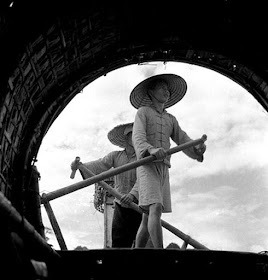
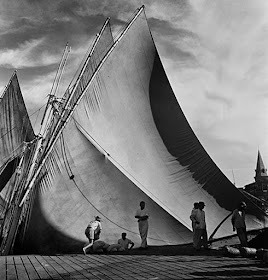
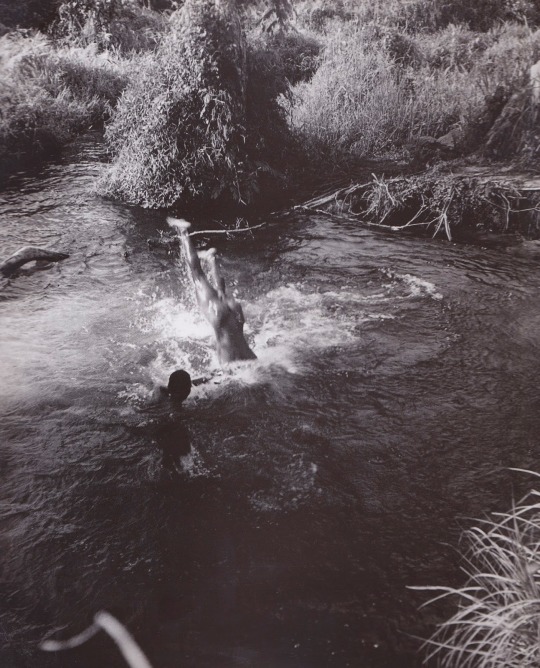
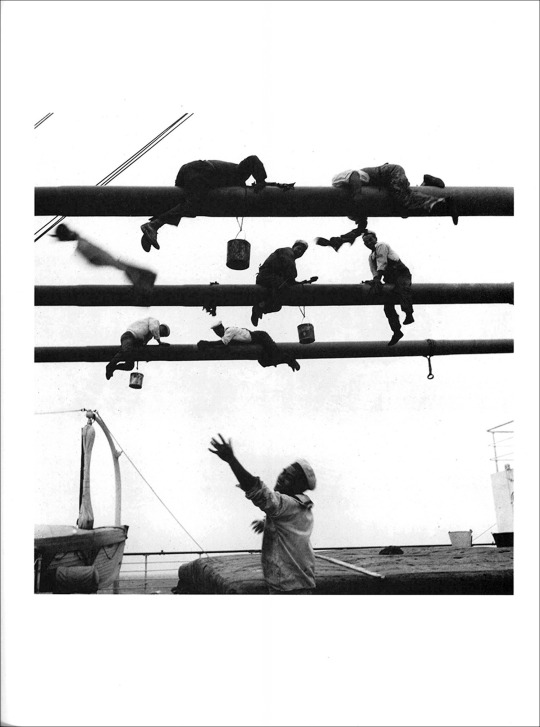
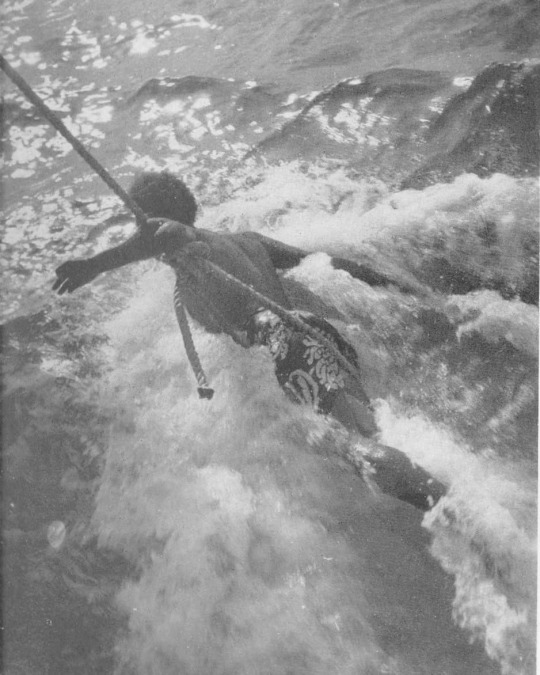

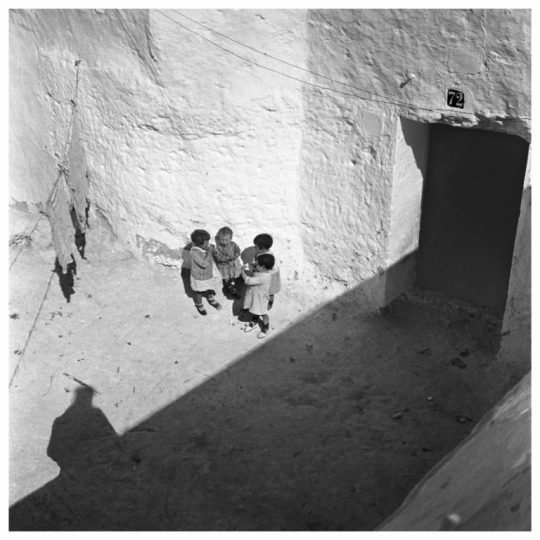
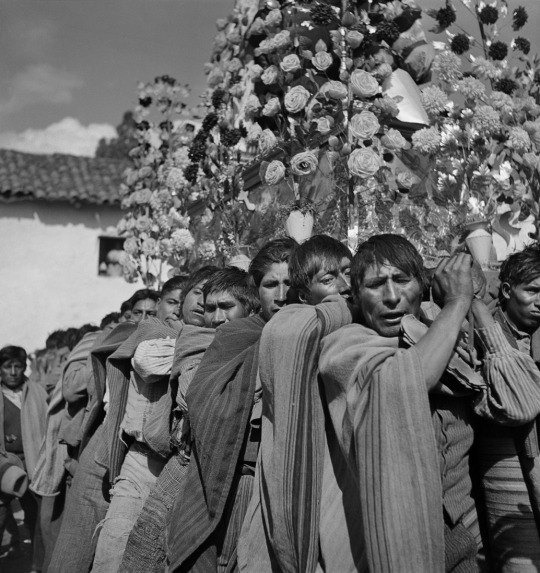
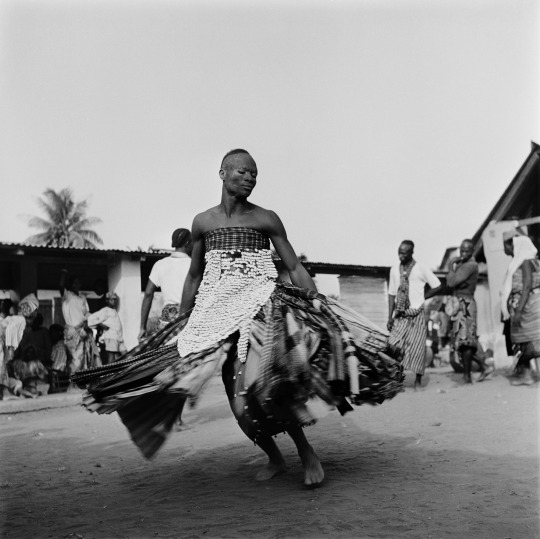
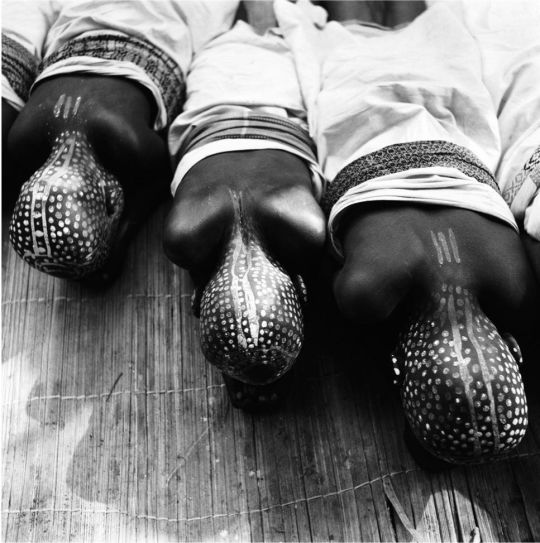
Veger's contributions to ethnography are embodied in dozens of conference papers, journal articles and books and were recognised by the Sorbonne University, which awarded him a doctorate in 1966, a feat for someone who dropped out of high school at the age of 17. Verger continued to study and document his chosen subject until his death in Salvador at the age of 94.
#fatumbi#Pierre verger#photography#culture#art collective#photomagazine#art#london#bnwphotography#photojournalism#ethnography
14 notes
·
View notes
Text
It fr pains me how fucking arrogant, selfish, and uneducated some of ya'll Americans are about the crisis in Ukraine.
There has already been "fake news claims", isolationist mentality, and some wierd ass shit like "Ukrainian lives don't matter until black lives do" or "if ur an empath ur allowed to ignore literal war crimes". Tf? Ur American? Unless u literally survived a war/extreme trauma, fucking just read the news. Ur just feeling uncomfortable about ur own privilege.
Full offense, shut the fuck up. People are dying and they have been for years.
I'll break down why all members of western countries should care (from an ex-history major):



In WW1/WW2, America's stance on those wars initially was isolationist.
WW1 was basically a royal incest cousin squabble and WW2 was literal war crimes.
Right before Hitler, Stalin starved Ukrainians. This genocide is called "Holodomor". Some historians believe it was unintentional, but others believe it was.
Hitler rose to power from 1933-1939, slowly amassing an army and building weaponry. This was illegal as per the Treaty of Versailles (June 28 1919) the main treaty signed at the Paris Peace Conference.
He annexed several nations (once again, illegal) and the west sat idly by. They didn't act until Poland was invaded.
Of course, some historians argue that the west did not want to see another war because of the horrors of trench warfare during WW1 (watch the 1930s film version of "All Quiet on the Western Front") and the Great Depression was fucking ass.
Understandable, but still wtf. Also, the Great Depression was actually 100% American rich ppls fault.
America had introduced the credit system, which allowed farmers to borrow money to purchase farm goods. Great and all, until insider trading happens, all the money dissapears from the banks, no money can be borrowed, fucking up the economy resulting in "Black Friday" aka the stock market crash of Nov 1929.
This was really bad, cuz if the American economy was fucked up, so was the Europeans. America was lending money to Germany to pay for reperations to the European nations as per the Treaty of Versailles.
That meant that Germany now could not pay its debts. This was detrimental as countries like France were very much relying on that stream of money as they suffered immense physical damage to their nation.
This lead to the Great Depression, affecting almost every country in the world, as everyone relied on either Europe of America for goods/services/ect.
Obviously antisemitism, Hitler was fucked up, ect were the main reason for WW2, but one can imagine how differently WW2 would have played out in an economically peaceful time.
Fast forward to the Cold War. Russia vs USA. Nuclear war was imminent. Satellite states. The Red Scare. McCarthyism.
Ukraine was a satellite state/a founding nation of the USSR for 70+ years (1922-1991)
This meant Ukraine was stripped of its autonomy and basic human rights for almost 100 years.
Ukraine gained it's independence after the 90s, but was under constant threat of interference.
In 2013, the ruling leader at the time (friends w/ Putin) made laws that were unconstitutional. This lead to a peaceful student protest which ended in a bloody massacre by the absolutely immoral and cruel special police; Berkut. ("Winter on Fire" is a moving docu about this event) The protest was later called Euromaidan or the Revolution of Dignity.
Then in 2014 Crimea was annexed by Russia. Literal months after war crimes against Ukrainian people's was enacted.
Basically what I'm saying is, humans are fucked up, especially those in power. It's our responsibility to back up those nations in need and stop centering those not affected.
Donate to your local Ukranian cultural center, aid centres, Ukrainian non profits. Protest in front of Russian embassies, write to your local representative, talk to your friends, families, and neighbours. This is what is civilians can do to make out voices heard to this in power.
Don't think that just cuz ur one person, you have no real voice. Ur human. Ur valued. We matter. We must fight together for our brothers and sisters, siblings, cousins, families across borders. I'm not Ukrainian but it doesn't matter. Every human has intrinsic value and you'd better be sure I'll fight tooth and nail for our people's.
Don't sit idly by while democracies and civil liberties are being stripped away. If this does not persuade you, how about the thought that your country is suffering economically and may suffer more directly if Putin is not dealt with?
8 notes
·
View notes
Text
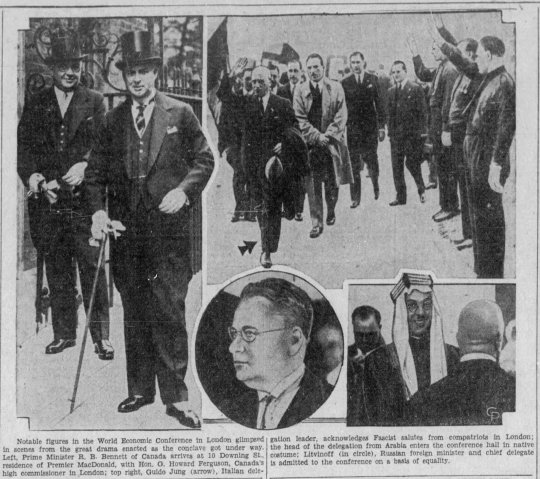
"Notable figures in the World Economic Conference in London glimpsed in scenes from the great drama enacted as the conclave got under way. Left. Prime Minister R. B. Bennett of Canada arrives at 10 Downing St., residence of Premier MacDonald, with Hon. G. Howard Ferguson, Canada's high commissioner in London; top right, Guido Jung (arrow), Italian delegation leader, acknowledges Fascist salutes from compatriots in London; the head of the delegation from Arabia enters the conference hall in native costume: Litvinoff (in circle), Russian foreign minister and chief delegate is admitted to the conference on a basis of equality." - from the Kingston Whig-Standard. June 26, 1933. Page 10.
#london#1933 world economic conference#capitalism in crisis#world conference#world crisis#r. b. bennett#prime minister of canada#canada in the british empire#high commissioner of canada#fascist italy#soviet union#british union of fascists#italian fascism#british empire#british history#interwar period
1 note
·
View note
Photo
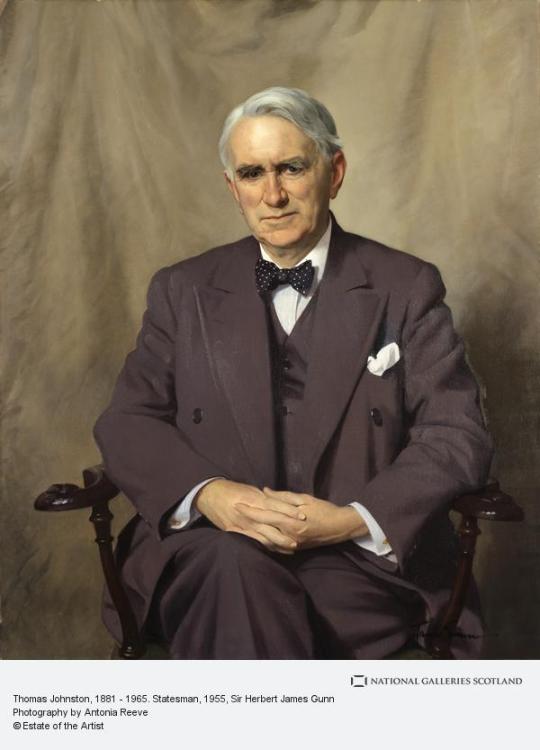
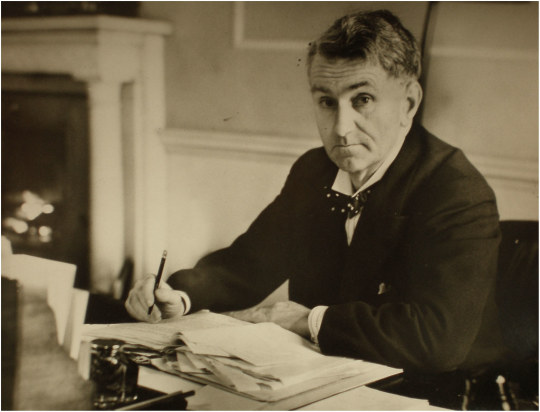
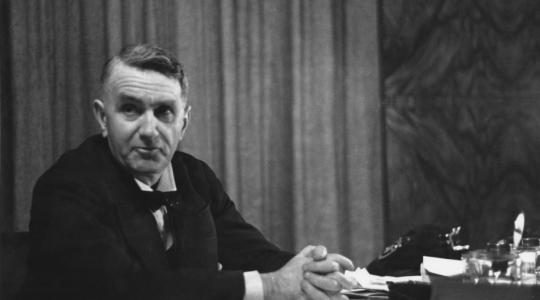
Tom Johnston, one of Scotland’s best known Secretaries of State, was born on November 2nd 1881.
Johnston was the son of David Johnston, a grocer, and his wife, Mary Blackwood, he was born in Kirkintilloch in and educated at Lairdsland Public School then at Lenzie Academy.
Tom then entered the University Glasgow where he became interested in politics and stood successfully for a local election in 1903 representing the Independent Labour Party.
In 1906, thanks to inheriting a printing press from a relative, he was able to set up The Forward, a radical weekly paper that reflected his Fabianism and teetotalism. He remained editor until 1933. It was in the early days of running the paper that he matriculated at the University as a mature student aged twenty-three.
In 1907 he continued his education and took a class in Moral Philosophy and gave his address as the Student Settlement, a pioneering student association interested in social improvement. The following year he enrolled for Economics, but he left without graduating.
He married Margaret F. Cochrane in 1914 and they were married for over 50 years, they had two children.
During the The First World War he advocated peace and attacked war profiteers. After the war he stood for parliament, and in 1922 won West Stirlingshire for Labour. The period of his greatest achievement was during the Second World War. Churchill appointed him as secretary of state for Scotland in 1941. He worked with colleagues of all parties to galvanise the Scottish economy on a war footing.
It was Tom Johnston who was instrumental in creating the North of Scotland Hydro- Electric Board, his greatest achievement, handling rural Scotland's resistance and hesitation towards the project intelligently. Until the 1940s, many rural areas of Scotland outwith the Central Belt had little or no electricity supply. There were coal-fired steam-turbine and some diesel-driven power stations serving urban locations.
In the three decades following the Second World War, the Hydro Board's teams of planners, engineers, architects and labourers succeeded in creating an epic succession of electricity generation and distribution schemes that were world-renowned not only for successfully achieving their technical aims in very demanding terrain but for often doing so in an aesthetically inspiring manner. The economic and social benefits thus brought to all the people of Scotland, and especially those in rural areas, were immense and long-lasting
In 1920 he published the History of the Working Classes in Scotland and from 1950 to 1952 he served as President of the Scottish History Society.
The University of Glasgow conferred the degree of Honorary LLD in 1945. In 1948 he was awarded the Freedom of the City of Aberdeen. He was also Chancellor of Aberdeen University from 1951 until his death.
Thomas Johnston died on 5 September 1965 in Milgavie.
8 notes
·
View notes
Text
Unfinished: April 12, 1945
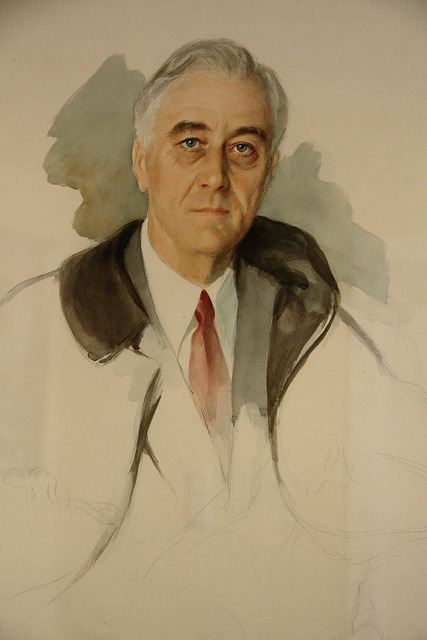
As March 1945 drew to a close, Franklin Delano Roosevelt was exhausted. At the beginning of February, Roosevelt had attended the Yalta Conference with Winston Churchill and Joseph Stalin -- a meeting which required the American President to undertake a physically punishing and extraordinarily dangerous trip halfway around the world to the Crimean Peninsula in the middle of a raging world war. At Yalta, Roosevelt’s appearance had shocked the foreign leaders and their aides. In his last face-to-face meeting with Churchill, on February 18, 1945, FDR was seen as a dead man walking. Churchill’s personal doctor, Lord Moran, told a friend that Roosevelt had “only a few months to live”.
Being President of the United States for just one term is taxing enough on a young man or a healthy man. Franklin Delano Roosevelt had been President for twelve years. He had campaigned for the Presidency and been victorious in four national elections. His Administration faced one of the greatest domestic crises in American History -- the Great Depression -- and the greatest crisis and bloodiest conflict in world history -- World War II. FDR had attacked these problems (and other issues that arose during his terms) with energy, creativity, and a relentless pursuit of victory.
A healthy and athletic man who stood nearly 6′2″ and weighed about 200 lbs. as Assistant Secretary of the Navy under Woodrow Wilson, Franklin Roosevelt had been stricken by polio in 1921. The disease robbed him of his ability to walk and, at the time, looked as if it had robbed him of a political future. He rebounded politically but physically he was never the same. Confined to a wheelchair, the muscles in his legs withered like the branches of a tree in winter. Although he could not walk under his own power, FDR taught himself to stand while wearing heavy steel braces around his shins. He needed the assistance of a muscular partner -- sometimes one of his sons, sometimes a military aide -- in order to feign the appearance of walking. Through sheer will, however, Roosevelt learned to take a few steps without anyone’s help -- a handy skill that he would show off at important campaign rallies. But as he began his unprecedented fourth term in the White House in the early months of 1945, FDR no longer had the energy to show off.
Roosevelt was as gravely ill as Lord Moran suggested. The successful 1944 Presidential campaign had severely drained his already tapped-out reservoirs of energy and stamina. His fourth inauguration was low-key, partly because it took place in the midst of war and partly due to the President’s failing health. Instead of the traditional inaugural ceremonies at the U.S. Capitol, Roosevelt took the Oath of Office at the White House and gave his brief fourth Inaugural Address from a balcony at the Executive Mansion. The famously verbose Roosevelt gave the second-shortest Inaugural Address in American History. By the time the crowd realized that he was talking he had already finished. Only George Washington’s four-sentence-long second Inaugural Address in 1793 was shorter than the address given by FDR on January 20, 1945.
FDR now looked entirely different than the man who had told the nation that “the only thing we have to fear is fear itself” in 1933. Dark circles surrounded his eyes, which seemed sunken into his skull. Since his first Inauguration, Roosevelt had lost 40-50 pounds. His hands shook so violently at times that some observers wondered how he was able to eat. He smoked constantly, but rarely finished his cigarettes. Most shocking of all, FDR no longer went to great lengths to conceal his disability. Frail and tired, he found it almost impossible to wear the heavy braces that he long wore on his crippled legs. On March 1, 1945, Roosevelt addressed a joint session of Congress on the results of his Yalta Conference with Churchill and Stalin. In an unprecedented move, the President sat in a chair on the floor of the House of Representatives and apologized to Congress, beginning his speech by saying, “I hope that you will pardon me for this unusual posture of sitting down during the presentation of what I want to say, but I know that you will realize it makes it a lot easier for me not to have to carry about ten pounds of steel around on the bottom of my legs.” It was the first time that President Roosevelt had ever publicly acknowledged his physical disability.
Twelve years of the Presidency, economic depression and war had strained Roosevelt’s health, but the 14,000-mile trip to the Yalta Conference on the Black Sea had pushed FDR to the limit. On March 30, 1945, Roosevelt arrived in Warm Springs, Georgia for a few weeks of relaxation and, hopefully, recuperation. Roosevelt loved Warm Springs. He had started visiting the small town in western Georgia in the 1920s, hoping that the warm waters from the natural mineral springs nearby would help him regain the use of his legs. When he was Governor of New York, FDR purchased a small house that he used when he visited Warm Springs. As President, the home was called the “Little White House” and although FDR only visited it sixteen times during his Presidency, many of those trips were for 2-3 weeks each. When his train pulled into Warm Springs at about 1:30 PM on March 30, 1945, many longtime residents said that things seemed different. Roosevelt looked terrible and while he waved to onlookers, it was with noticeable weakness.
The first few days in Georgia were tough. FDR was obviously ill and seemed to struggle making it through a church service on Easter Sunday. Roosevelt also avoided his beloved Warm Springs pools. Instead, the President rested, caught up on sleep, and visited with guests. The goal was for FDR to regain enough of his health to make a trip to San Francisco for the charter meeting of what would become the United Nations. At the Little White House with Roosevelt were some personal aides, military attaches, and cousins Daisy Suckley and Polly Delano. During his first week at Warm Springs, Roosevelt did very little work, dictating a few letters and reading briefings, stronger and more animated in the mornings and evenings but completely drained in the afternoon. Another goal for Roosevelt was to gain weight -- by the time he left Warm Springs, he hoped to be up to 170 lbs.
Still, there was no noticeable improvement in FDR’s health or spirits. Then, on April 9th, Lucy Mercer Rutherfurd arrived. As President Wilson’s Assistant Secretary of the Navy, Franklin D. Roosevelt had become involved in a passionate love affair with his wife’s social secretary, Lucy Mercer. It was 1918 when Eleanor Roosevelt discovered the affair between Franklin and Lucy and threatened to divorce him unless he promised never to see or speak to Lucy again. FDR agreed to the ultimatum -- an ultimatum that was strengthened by his mother’s threat to cut off his inheritance if he and Eleanor were divorced, as well as the fact that Franklin’s budding political career would be crushed if the affair was revealed. The relationship between FDR and Eleanor was never again passionate or loving after the discovery of the affair, but Eleanor kept her word and remained married to Franklin. Franklin, however, didn’t keep his word to Eleanor.
The Franklin-Lucy affair probably resumed shortly after Roosevelt’s first Inauguration in 1933. By that time, FDR and Eleanor had more of a professional relationship than a personal one. He respected the First Lady’s political viewpoints, supported her activism, used her as a sounding board, and tried to act on many of her suggestions. Personally, however, there was no passion or tenderness or intimacy between the First Couple. It was FDR and Eleanor’s daughter, Anna, who helped rekindle Franklin’s relationship with Lucy. She arranged for Lucy to visit the President in the White House when Eleanor was out of town. And on April 9, 1945, Lucy Mercer Rutherfurd was in Warm Springs, Georgia visiting President Roosevelt due to Anna Roosevelt’s invitation.
FDR was so excited to see Lucy that he didn’t wait for Lucy to make the drive all the way from Aiken, South Carolina to Warm Springs. The President and his cousin Daisy decided to meet Lucy’s car en route. At Manchester, Georgia, 85 miles away from Warm Springs, the highway rendezvous took place. FDR looked happier than he had in months as Lucy got into FDR’s car along with her friend, painter Elizabeth Shoumatoff. Lucy had brought Shoumatoff along to paint a portrait of the President -- a portrait that she hoped would be an improvement on the recent photographs that had made Roosevelt look “ghastly”.
For the next two days, Roosevelt and Lucy enjoyed their time together, going on small drives, eating happy meals, and sitting together while Shoumatoff prepared to paint the President’s portrait, studying photographs and making preliminary drawings. Daisy Suckley had the opportunity to observe the unique relationship between FDR and Lucy Mercer and also had some private conversations with the President’s longtime mistress. In her diary, Daisy recorded her thoughts about the two after she accompanied them on an automobile drive that they took: “Lucy is so sweet with F(ranklin) -- No wonder he loves to have her around -- Toward the end of the drive, it began to be chilly and she put her sweater over his knees -- I can imagine just how she took care of her husband -- She would think of little things which make so much difference to a semi-invalid, or even a person who is just tired, like F(ranklin).”
On April 12th, President Roosevelt woke up and ate a light breakfast. He had a slight chill despite the warm, humid weather that day and wore his cape draped over his shoulders throughout the early afternoon. Roosevelt did a little bit of work, reading the Atlanta newspapers and dictating some correspondence. Elizabeth Shoumatoff had set up her easel in the living room where the President worked behind a card table that served as his makeshift desk. As Shoumatoff painted, FDR continued reading, and at about 1:00 PM, Roosevelt said, “We have got just about fifteen minutes more to work.”
In the quiet of the room, Daisy Suckley thought that the President had dropped his cigarette and was searching for it because his head slumped forward suddenly. Roosevelt could barely lift his head when Daisy asked what was wrong. He placed his left hand gently against the back of his head and, in a barely audible voice, told Daisy, “I have a terrific pain in the back of my head!”
Roosevelt quickly slipped into unconsciousness as the women in the room summoned help. They called for a doctor who was staying in a cottage close to the Little White House and they helped two of FDR’s valets carry the President into the bedroom. Roosevelt’s hands and feet were ice cold, but he was still breathing. Smelling salts were administered but FDR was unresponsive. As the doctor and aides tried to help the President, Lucy Mercer Rutherfurd and Elizabeth Shoumatoff recognized the hopelessness of the situation. They also recognized the potential scandal that was possible if it was learned that the President collapsed in the presence of his longtime mistress.
Shoumatoff packed up all of her paints and the unfinished portrait she had been working on. Lucy Mercer grabbed her belongings and took one last look at her beloved Franklin. He was still alive when they left, but he was breathing laboriously and his eyes no longer recognized Lucy. Lucy and Elizabeth Shoumatoff had been on the highway back to Aiken, South Carolina for an hour when President Franklin Delano Roosevelt died in Warm Springs at 3:35 PM. The official cause of death was a cerebral hemorrhage. FDR was 63 years old.
Eleanor Roosevelt was notified of her husband’s death a few minutes after 4:00 PM. She summoned Vice President Harry Truman to the White House while he was having a drink at the U.S. Capitol with House Speaker Sam Rayburn. Truman wasn’t told why he needed to hastily come to the White House, but he knew it sounded urgent. As Truman left the Capitol, he ran into a young Congressman who questioned the Vice President about his speedy exit -- a young Congressman named Lyndon Johnson.
At the White House at 5:30 PM, Eleanor Roosevelt broke the news to the Vice President simply a directly: “Harry, the President is dead.” Truman was stunned and asked what he could do for the widowed First Lady. Eleanor smiled sadly and asked, “Is there anything we can do for you? For you are the one in trouble now.” At 7:00 PM, Chief Justice Harlan Fiske Stone administered the Oath of Office to Truman as the 33rd President of the United States.
By that time, Eleanor was on her way to Warm Springs to claim her husband’s body. At about midnight, she arrived at the Little White House in Georgia where she asked about her husband’s last hours. It was then that she learned news almost as shocking as the President’s death. Eleanor found out that FDR had been with his former mistress Lucy Mercer Rutherfurd when he was stricken. She spent 45 minutes alone with his body, picked out the clothing for his burial, but never lost her composure despite the shocks that she experienced that day.
A funeral train returned FDR’s body to Washington, D.C. the next day. Roosevelt was embalmed by morticians who found that the President’s arteries were so hardened that they could barely inject the embalming fluid into his body. FDR’s body laid in state in the East Room of the White House almost 80 years to the day that Abraham Lincoln’s body rested in the very same place following his assassination. On the 80th anniversary of Lincoln’s death -- April 15, 1945 -- Franklin Delano Roosevelt was buried in the garden of his beloved estate Hyde Park on the Hudson River in New York. Upon his death, the New York Times wrote of the deceased President:
“Men will thank God on their knees a hundred years from now that Franklin D. Roosevelt was in the White House. It was his hand, more than that of any other single man, that built the great coalition of the United Nations. It was his leadership which inspired free men in every part of the world to fight with greater hope and courage. Gone is the fresh and spontaneous interest which this man took, as naturally as he breathed air, in the troubled and the hardships and the disappointments and the hopes of little men and humble people.”
Elizabeth Shoumatoff’s Unfinished Portrait of President Roosevelt -- which she was working on when he died -- now hangs in the Little White House in Warm Springs, Georgia.
#History#Franklin D. Roosevelt#FDR#President Roosevelt#Warm Springs#FDR Library#Death of Franklin D. Roosevelt#Presidents#Elizabeth Shoumatoff
72 notes
·
View notes
Text
“In the case of Afghanistan, America’s refusal to countenance the return of Zahir Shah may well have proved to be their greatest failure of imagination yet.
(…)
We were ushered into the garden room, there, on cane furniture, sat two old men. One, slightly-sunken of face but alert and with a smile waltzing over his lips, the other of a more military bearing. Dust eddied in the shafts of light as we passed, then settled as we did. We were visiting the 86 year old Zahir Shah, King of Afghanistan for 40 years between 1933 and 1973. With him was Lieutenant-General Sardar Abdul Wali Khan, who acted as an interpreter, it was entirely unnecessary as the King would answer in accurate though halting English.
We were there to discover if the old man was interested, or even able, to take up the reins again. His time as monarch (ended in a palace coup by his cousin, Mohamed Daud) had been one of unprecedented peace and prosperity for the mountain kingdom. In the late 1960s he introduced a new democratic constitution. Amongst other things, it guaranteed women’s rights and elections. He was also someone who was able to garner loyalty not just from his native Pashtun people, but from the Hazara, Tajik and Uzbeck minorities and the confidence of many of the regional powers.
The exiled king spoke of his visceral love for the country. That and his deep sadness. How, from his Roman exile he had seen his land first became a dictatorship after a palace coup, then a Soviet satellite state, ending in a Soviet inspired coup, the Soviet invasion of 1979 and the civil war that saw the death of 400,000 of its citizens between 1979 and the fall of the Taliban. Estimates suggest upwards of 10 per cent of the entire population were killed during that period, a salutary realisation that even 20 years ago Afghanistan had been a killing field for the previous 20 years.
(…)
These events had not dimmed the king’s desire to do what he could for the nation. He had told us he would do anything to secure peace. As he went on to do. Within a week of our meeting, he had made an informal agreement with the anti-Taliban Mujahedeen of the Northern Alliance.
(…)
At this point things were looking promising for a return of the king. But Pakistani Intelligence, the ISI, was uncomfortable with the prospect of a moderate in power in Afghanistan, and was even less happy by the combination of a Pashtun king, with the support of the Tajik, Uzbek and Hazara dominated Northern Alliance having political power.
Zahir at no time demanded the throne — indeed the Tajik, former President and leader of the Jamiat-e Islami rejected the idea out of hand — his offer was to convene a Loya Jorga, a gathering of all the tribal notables to create a new constitution. In November of that year the Bonn conference, which included all Afghan factions barring the Taliban, supported him as the interim leader.
And yet, by the time Zahir returned to Kabul with Hamed Karzi, the US had gone completely cold on the idea. Now their chosen man was Karzai, soon after American-led forces had driven the Taliban out of Kabul in 2002. It is clear that the US’s retreat from supporting the monarchical option was in part driven by their ties with the Pakistani ISI, for years they had starved the moderate Afghan nationalist Haq of support whilst feeding the Islamist factions of the Northern alliance.
(…)
The US, though it was aware of the possibilities of an Afghan solution to an Afghan problem, and a solution that could have utilised the residual loyalty of the Afghan peoples, decided against. The rest is dour, bloody history.”
“All empires die. The end is usually unpleasant. The American empire, humiliated in Afghanistan, as it was in Syria, Iraq, and Libya, as it was at the Bay of Pigs and in Vietnam, is blind to its own declining strength, ineptitude, and savagery. Its entire economy, a “military Keynesianism,” revolves around the war industry. Military spending and war are the engine behind the nation’s economic survival and identity. It does not matter that with each new debacle the United States turns larger and larger parts of the globe against it and all it claims to represent. It has no mechanism to stop itself, despite its numerous defeats, fiascos, blunders and diminishing power, from striking out irrationally like a wounded animal. The mandarins who oversee our collective suicide, despite repeated failure, doggedly insist we can reshape the world in our own image. This myopia creates the very conditions that accelerate the empire’s demise.
The Soviet Union collapsed, like all empires, because of its ossified, out-of-touch rulers, its imperial overreach, and its inability to critique and reform itself. We are not immune from these fatal diseases. We silence our most prescient critics of empire, such as Noam Chomsky, Angela Davis, Andrew Bacevich, Alfred McCoy, and Ralph Nader, and persecute those who expose the truths about empire, including Julian Assange, Edward Snowden, Daniel Hale, and John Kiriakou. At the same time a bankrupt media, whether on MSNBC, CNN or FOX, lionizes and amplifies the voices of the inept and corrupt political, military and intelligence class including John Bolton, Leon Panetta, Karl Rove, H.R. McMaster and David Petraeus, which blindly drives the nation into the morass.
Chalmers Johnson in his trilogy on the fall of the American empire – “Blowback,” “The Sorrows of Empire” and “Nemesis” – reminds readers that the Greek goddess Nemesis is “the spirit of retribution, a corrective to the greed and stupidity that sometimes governs relations among people.” She stands for “righteous anger,” a deity who “punishes human transgression of the natural, right order of things and the arrogance that causes it.” He warns that if we continue to cling to our empire, as the Roman Republic did, “we will certainly lose our democracy and grimly await the eventual blowback that imperialism generates.”
“I believe that to maintain our empire abroad requires resources and commitments that will inevitably undercut our domestic democracy and, in the end, produce a military dictatorship or its civilian equivalent,” Johnson writes. “The founders of our nation understood this well and tried to create a form of government – a republic – that would prevent this from occurring. But the combination of huge standing armies, almost continuous wars, military Keynesianism, and ruinous military expenses have destroyed our republican structure in favor of an imperial presidency. We are on the cusp of losing our democracy for the sake of keeping our empire. Once a nation is started down that path, the dynamics that apply to all empires come into play – isolation, overstretch, the uniting of forces opposed to imperialism, and bankruptcy. Nemesis stalks our life as a free nation.”
If the empire was capable of introspection and forgiveness, it could free itself from its death spiral. If the empire disbanded, much as the British empire did, and retreated to focus on the ills that beset the United States it could free itself from its death spiral. But those who manipulate the levers of empire are unaccountable. They are hidden from public view and beyond public scrutiny. They are determined to keep playing the great game, rolling the dice with lives and national treasure. They will, I expect, preside gleefully over the deaths of even more Afghans, assuring themselves it is worth it, without realizing that the gallows they erect are for themselves.”
“We waged war in Afghanistan - twenty years of war, thousands of American lives lost, tens of thousands of Afghan lives lost, over 2 trillion dollars spent - but we did not wage peace. We went, we fought, we supported a corrupt Afghan government almost as abusive to the people there as the Taliban had been, we droned, we bombed, we tried to build an army of some of the historically best fighters in the world in the image of the American armed forces (so arrogant are we), we tried to build an Afghanistan in the image of our own country (so delusional are we) - and yeah, we did some good things too. In the end, we aren’t just the last in a long line of empires defeated in Afghanistan. Even worse, we’re the last in a long line of empires that raped and plundered it before we left.
God help us, if we don’t learn from this.”
#afghanistan#monarchy#taliban#islam#george bush#Obama#donald trump#biden#chris hedges#empire#soviet union#marianne williamson
2 notes
·
View notes
Text
Open main menu
Wikiquote
Search Wikiquote
Smedley Butler
United States Marine Corps general, two time Medal of Honor recipient, activist, lecturer, official, and writer
Language
Download PDF
Watch
Edit
I served in all commissioned ranks from Second Lieutenant to Major-General. And during that period, I spent most of my time being a high class muscle-man for Big Business, for Wall Street and for the Bankers. In short, I was a racketeer, a gangster for capitalism.
Major General Smedley Darlington Butler (July 30, 1881 – June 21, 1940), was a United States Marine Corps major general, the highest rank authorized at that time, and at the time of his death the most decorated Marine in U.S. history.
Contents
Quotes Edit
War is just a racket. A racket is best described, I believe, as something that is not what it seems to the majority of people. Only a small inside group knows what it is about. It is conducted for the benefit of the very few at the expense of the masses.
From a speech (1933)
I spent thirty-three years and four months in active military service as a member of this country's most agile military force, the Marine Corps. I served in all commissioned ranks from Second Lieutenant to Major-General. And during that period, I spent most of my time being a high class muscle-man for Big Business, for Wall Street and for the Bankers. In short, I was a racketeer, a gangster for capitalism.
From a speech (1933)
I believe in adequate defense at the coastline and nothing else. If a nation comes over here to fight, then we'll fight. The trouble with America is that when the dollar only earns 6 percent over here, then it gets restless and goes overseas to get 100 percent. Then the flag follows the dollar and the soldiers follow the flag.
From a speech (1933)
War is a racket. It always has been.
I wouldn't go to war again as I have done to protect some lousy investment of the bankers. There are only two things we should fight for. One is the defense of our homes and the other is the Bill of Rights. War for any other reason is simply a racket.
From a speech (1933)
"My interest is, my one hobby is, maintaining a democracy. If you get these 500,000 soldiers advocating anything smelling of Fascism, I am going to get 500,000 more and lick the hell out of you, and we will have a real war right at home."
Reply to Gerald MacGuire, after being asked to organize WWI veterans (for military support) in a fascist-coup of FDR, as related by Butler in testimony before Congress, 1934. A reporter (a Butler confidant) testified MacGuire said, "We might go along with Roosevelt and then do with him what Mussolini did with the King of Italy." Which was, made him a figure-head.
War is a racket (1935) Edit
Full text online
War is a racket. It always has been. It is possibly the oldest, easily the most profitable, surely the most vicious. It is the only one international in scope. It is the only one in which the profits are reckoned in dollars and the losses in lives.
It is possibly the oldest, easily the most profitable, surely the most vicious. It is the only one international in scope. It is the only one in which the profits are reckoned in dollars and the losses in lives.
A racket is best described, I believe, as something that is not what it seems to the majority of the people. Only a small "inside" group knows what it is about. It is conducted for the benefit of the very few, at the expense of the very many. Out of war a few people make huge fortunes.
In the World War [I] a mere handful garnered the profits of the conflict. At least 21,000 new millionaires and billionaires were made in the United States during the World War. That many admitted their huge blood gains in their income tax returns. How many other war millionaires falsified their tax returns no one knows.
How many of these war millionaires shouldered a rifle? How many of them dug a trench? How many of them knew what it meant to go hungry in a rat-infested dug-out? How many of them spent sleepless, frightened nights, ducking shells and shrapnel and machine gun bullets?...How many of them were wounded or killed in battle?
Out of war nations acquire additional territory, if they are victorious. They just take it. This newly acquired territory promptly is exploited by the few -- the selfsame few who wrung dollars out of blood in the war. The general public shoulders the bill.
And what is this bill? This bill renders a horrible accounting. Newly placed gravestones. Mangled bodies. Shattered minds. Broken hearts and homes. Economic instability. Depression and all its attendant miseries. Back-breaking taxation for generations and generations.
For a great many years, as a soldier, I had a suspicion that war was a racket; not until I retired to civil life did I fully realize it. Now that I see the international war clouds gathering, as they are today, I must face it and speak out.
But what does it profit the men who are killed? What does it profit their mothers and sisters, their wives and their sweethearts? What does it profit their children? What does it profit anyone except the very few to whom war means huge profits? Yes, and what does it profit the nation?
There are 40,000,000 men under arms in the world today, and our statesmen and diplomats have the temerity to say that war is not in the making. Hell's bells! Are these 40,000,000 men being trained to be dancers?
A few profit – and the many pay. But there is a way to stop it. You can't end it by disarmament conferences. You can't eliminate it by peace parleys at Geneva. Well-meaning but impractical groups can't wipe it out by resolutions. It can be smashed effectively only by taking the profit out of war.
The normal profits of a business concern in the United States are six, eight, ten, and sometimes twelve percent. But war-time profits -- ah! that is another matter -- twenty, sixty, one hundred, three hundred, and even eighteen hundred per cent -- the sky is the limit.
Of course, it isn't put that crudely in war time. It is dressed into speeches about patriotism, love of country, and "we must all put our shoulders to the wheel," but the profits jump and leap and skyrocket -- and are safely pocketed.
I spent 33 years and four months in active military service and during that period I spent most of my time as a high class muscle man for Big Business, for Wall Street and the bankers. In short, I was a racketeer, a gangster for capitalism.
I helped make Mexico and especially Tampico safe for American oil interests in 1914. I helped make Haiti and Cuba a decent place for the National City Bank boys to collect revenues in. I helped in the raping of half a dozen Central American republics for the benefit of Wall Street. I helped purify Nicaragua for the International Banking House of Brown Brothers in 1902-1912. I brought light to the Dominican Republic for the American sugar interests in 1916. I helped make Honduras right for the American fruit companies in 1903. In China in 1927 I helped see to it that Standard Oil went on its way unmolested. Looking back on it, I might have given Al Capone a few hints. The best he could do was to operate his racket in three districts. I operated on three continents.
What business is it of ours whether Russia or Germany or England or France or Italy or Austria live under democracies or monarchies? Whether they are Fascists or Communists? Our problem is to preserve our own democracy. And very little, if anything, has been accomplished to assure us that the World War was really the war to end all wars.
Yes, we have had disarmament conferences and limitations of arms conferences. They don't mean a thing. One has just failed; the results of another have been nullified. We send our professional soldiers and our sailors and our politicians and our diplomats to these conferences. And what happens?
The professional soldiers and sailors don't want to disarm. No admiral wants to be without a ship. No general wants to be without a command. Both mean men without jobs. They are not for disarmament. They cannot be for limitations of arms. And at all these conferences, lurking in the background but all-powerful, just the same, are the sinister agents of those who profit by war. They see to it that these conferences do not disarm or seriously limit armaments.
2 notes
·
View notes